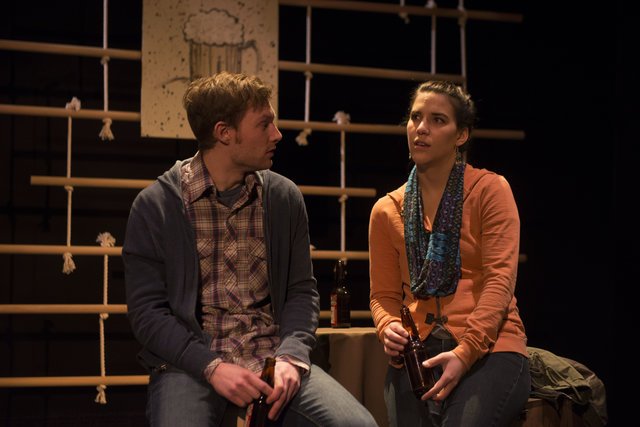December 18, 2017
 Ontario Presents and its member presenting organizations recognize the importance of presenting Indigenous artists, stories and culture as part of their presenting practice. As we continue to encourage the respectful presentation of Indigenous art, we will be featuring an Indigenous artist each month in our e-newsletter and blog. Spotlights are developed with the artist, and are intended simply to share the artist’s work and foster greater awareness and understanding of the strength and diversity of Indigenous art available in Ontario and beyond.
Ontario Presents and its member presenting organizations recognize the importance of presenting Indigenous artists, stories and culture as part of their presenting practice. As we continue to encourage the respectful presentation of Indigenous art, we will be featuring an Indigenous artist each month in our e-newsletter and blog. Spotlights are developed with the artist, and are intended simply to share the artist’s work and foster greater awareness and understanding of the strength and diversity of Indigenous art available in Ontario and beyond.
This month, we sat down with playwright, actor, and director Falen Johnson.
To get us started, can you share a bit about yourself and your work?
I am from Mohawk and Tuscarora from Six Nations Reserve which is about an hour and a half south-west of Toronto. I grew up on and off the rez so I have always felt like I’ve had my feet in two worlds and that most definitely informs my work. I have always had this inner battle of identity. And I know it is a battle that many other Indigenous folks have as well. I like to make space for not knowing, for questioning who we are as Indigenous people and what does that spectrum of identity look like.
What would you most like presenters and audiences to know about your artistic practice?
That it is okay to laugh. Frequently Indigenous theatre is thought to be heavy and depressing but I attempt to balance some of my heavier material with humour. Many of our storytellers do this. We are a funny people and we appreciate humour. In my work I like to create an atmosphere where an audience trusts me to take them to a place where they can laugh as well as feel other emotions deeply.
Can you speak to your use of art, and specifically humour, to inform and educate?
For me, I try to get the laugh first. If I get the laugh then I can crack the audience open a little, get them to trust me and once they trust they can be more receptive to the words and, if there is a teaching, receive it. I want those peaks and valleys in my work. I think most playwrights live for laughs and tears. I think it’s one of the benefits to being a playwright, we get to see how the work lands, and laughs and tears are the most obvious sign that something is working.
You recently programmed the Guswenta Gathering, a festival of Indigenous work at Soulpepper, with theatre artist Cole Alvis. You both commented in an interview that you felt  the project was a sort of “path clearing” to create a place that feels more accessible to Indigenous artists. In your view, what can we in the presenting field do to continue this process of creating welcoming and accessible space?
the project was a sort of “path clearing” to create a place that feels more accessible to Indigenous artists. In your view, what can we in the presenting field do to continue this process of creating welcoming and accessible space?
Allowing smudging (the practice of burning traditional medicine), is a big step venues can take. Currently, I don’t personally smudge with my work but many artists do. For some artists it is essential. It can be as necessary as vocal or physical warm up.
Find out what your Indigenous artists need to perform. Have the conversation and ask questions in advance of presentation. Is the space a smudging-friendly space? If not, have you made accommodations for a smudging space and time? Does the venue staff know what it is any why it happens? Initial discussions can help to prevent uncomfortable situations for both presenter and presentee.
The Indigenous Performing Arts Alliance created a smudging document a few years back and it is a great resource to start to have these conversations.
This summer saw the premiere of your new play Ipperwash. The process for creating that play was very unique, can you talk a bit about that process and why it was so important?
Ipperwash was very unique. It was a commission piece by Blyth Festival Theatre and it was equal parts challenge and reward. The story of Ipperwash has been told a number of times, in books, TV shows, newspaper articles. But the feeling was the same with just about everyone we spoke to. People come in the area to get the story, they get what they want and then leave. We didn’t want to do that.
So we hosted information sessions in the community with food and even door prizes. We met with council. We read the material that I was writing to the community and got feedback. We engaged two community consultants. We even went to the pow wow with a good portion of the creative team. Director Jessica Carmichael really pushed for rehearsals to be held in the community and even helped to set up ceremonies there.
 What’s next for you? Do you have any upcoming projects you would like to share about?
What’s next for you? Do you have any upcoming projects you would like to share about?
Ipperwash is being remounted at Native Earth Performing Arts in Toronto and I will be directing so that is very exciting. We head into rehearsals in early January. I have done some extensive rewrites on the piece so it feels very much like a different show so I am curious how the new material will land.
I head to The Belfry in Victoria in March to direct my first play Salt Baby which I am really looking forward to. I’ve also been working on a podcast called The Secret Life of Canada, created by myself and fellow playwright Leah Simone Bowen with editing by Katie Jensen. The success of it kinda snuck up on Leah and I and we are really excited to see where it takes us.
Where can people learn more about (or see) your work or get in touch?
Oh I need a website so badly! New Years Resolution, website in 2018. For now you can find me on Twitter, or other social media.
Photo: Falen Johnson headshots by Liz Beddall, courtesy of Falen Johnson. Image from Salt Baby by Darrol Hofmeister via WhatsUpYukon

